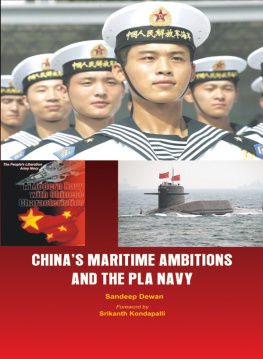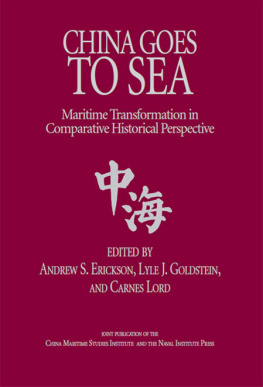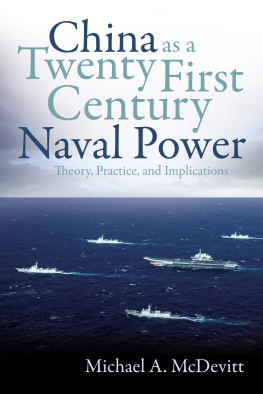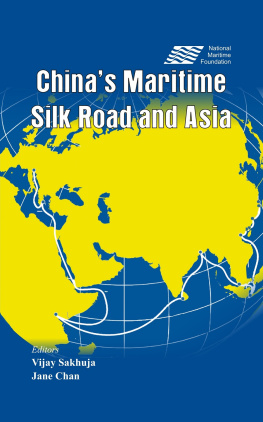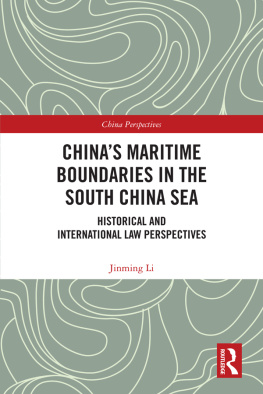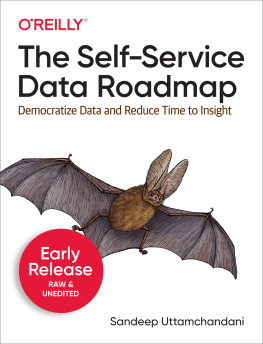Published by
Vij Books India Pvt Ltd
(Publishers, Distributors & Importers)
2/19, Ansari Road, Darya Ganj
New Delhi - 110002
Phones: 91-11-43596460
Fax: 91-11-47340674
e-mail :
web: www.vijbooks.com
Copyright 2013, United Service Institution of India, New Delhi
ISBN: 978-93-82573-30-2
All rights reserved
No part of this book may be reproduced, stored in a retrieval system, transmitted or utilised in any form or by any means, electronic, mechanical, photocopying, recording or otherwise, without the prior permission of the copyright owner. Application for such permission should be addressed to the publisher.
The views expressed in the book are of the author and do not necessarily represent the views of the organization that he belongs to or of the United Service Institution of India.
Printed in India
at Narula Printers, Delhi
Foreword
This volume and the other works from the research staff of the United Services Institution of India (USI) are intended to explore from an academic, professional and operational perspective various dimensions of challenges facing India and their implications to the Indian policy. With several distinguished officers from the armed forces and other streams evincing increasing interest in availing study leave and conducting research at the USI for a stipulated time period, today we have a number of researchers at the USI working on a wide spectrum of topics. Typically, a researcher would go through a structured academic activity ranging from selecting the topic for research, browsing through the collections of the USI, analyzing and presenting the findings to a peer-group and then after incorporating suggestions and critique would again go through the process of peer-review of the manuscript for publication.
Sandeep Dewans current manuscript had gone through all the above stages with inputs incorporated from many a quarter. The subject matter is also close to his profession maritime and naval issues. The result of these two professional background and institutional backup of the USI is particularly seen in the quality of his work below. With extensive study, copious notes and operational knowledge, the author had reflected on the history of Chinas maritime power, its metamorphosis due to the external and internal stimuli, blue water ambitions and its implications for regional and global balance of power and on India for the foreseeable future.
Sandeep Dewan is a sailor- scholar, distinguishing himself as a Naval Officer and involving extensively in the research activities of the USI, conducting conferences, writing about significant developments in the maritime domain in the neighbourhood, specifically with focus on China, and in evolving policy options for the larger strategic community in India. Dewans findings in this work are sober in nature, ie, despite acquiring innumerable modern platforms and enhancing its professional standards in the recent years, Chinas naval forces are yet to pose severe challenges to India in the Indian Ocean Region. In contrast several scholars, retired naval officers and others have argued that we need to note the emerging capabilities of the PLAN in the future. In the chapter below on PLANs Quest for Seas Beyond Chinas Shores, Dewan argues that despite Chinas assertiveness, its current or envisaged near future maritime capabilities do not afford her the ability to operate credible maritime forces to power project in distant waters.
An overall context of the subject is also necessary here. Several scholars had written substantially on various core aspects of Chinas maritime and naval developments. These include Bruce Swanson, David G Muller, John Wilson Lewis and XueLitai, Bernard D Cole, James C Bussert & Bruce A Elleman, Andrew Erikson, Peter Howarth, You Ji, Li Nan, Thomas M Kane, myself and many others. While each of these authors have reflected on many an important aspect of Chinas naval forces, Dewans work intends to bridge many a gap in the current literature on Chinas navy and maritime issues with special focus on recent ambitions of China and their effect on balance of power in the region.
At the cost of over generalisation, it could be said that China historically, with the exception of the Ming Dynasty maritime expeditions, had been continentally focused with hardly any attention to the maritime dimensions. During the 19th century, after the two Opium Wars, there had been some efforts as a part of the Wei Yuans treatises and Hundred Days Reform to strengthen the maritime and naval capabilities. However, these efforts remained short-lived. Despite the Soviet help in raising 157 basic industries including 41 in the defence sector (and in the naval sphere) Maos China considered the ground forces as more significant than the other forces. Minister for National Defence Lin Biao as well tried to usher in regional deterrence strategy in the 1960s but was unable to dent into the predominantly the US-USSR dominated Cold War in the region. The US-led alliances with Japan, South Korea, Taiwan, Australia and others to a large extent constrained the growth of Chinas Navy. During Deng Xiaopings tenure, as a result of reform and opening up from 1978, a new lease of life was provided to Chinas Navy.
This is partly due to the growing maritime trade (as a result of the establishment of the export-processing zones across the coastal regions) and partly to the rise in the sea-faring faction within the armed forces and the Communist Party. The former became the corner stone for the rise of China with maritime trade becoming a significant proportion more than half of the gross domestic product and hence became to be factored as a vital national interest of the country to be expanded and protected. The latter sea-faring faction is represented by Admiral Liu Huaqing who made long-term projections for the growth of a blue water navy till about 2045. Subsequently, his vision is reflected in modifying the countrys naval strategy, reorganization of the naval structure and personnel, hard and soft ware acquisitions, training programmes and naval exercises across the three sea fleets and on the high seas. That the Navy has become of the major foci of Chinas leadership is also clear from the statements made by Jiang Zemin and Hu Jintao in the recent period, specifically the Qingdao fleet review speech recently. There is also the higher defence outlay that the Navy received recently, when it was termed as a strategic force given the power projection nature of the armed service.
A few scenarios could be identified in relation to the emerging maritime and naval ambitions of China. Firstly, given the coordinated development between the economy and the military (and hence the navy), we could expect higher defence outlays in the naval sphere so as to transform Chinas Navy into a blue water capable force in the mid of the 21st century. Chinas operationalisation of newer surface and subsurface naval platforms in the recent period has such ambitions. This is expected to initially lead to frictions with the dominant navies in the region, including that of the United States Navy, Japans Self Defence Maritime Forces, Republic of Korea Navy, Republic of China (Taiwan) Navy, Vietnamese Navy, Philippines Navy and others. In the backdrop of the South China Sea Islands dispute, it is also noticeable that the Russian Navy had also become active with sale of naval equipment (Kilo-class submarines, Su-27 aircraft and others to Southeast Asian countries). Indeed, after the March 2009 incident of Chinas naval platforms trailing the US Navy vessels, and in the aftermath of Gen. Ma Xiaotians reported objections to the US-South Korean naval exercises in the Yellow Sea and also Chinas naval surveillance over the Japanese-controlled Senkaku Islands, such frictions have multiplied. The Southeast Asian nations summit meetings, along with others including China, at Hanoi and Bali (if not at Phnom Penh) recently proved that the maritime issues are of highly contentious ones in the recent period. The recently announced US rebalancing in Asia is also in this direction. Dewans thesis below predicts that China will, over a period of time, adjust and come to terms with this scenario.

